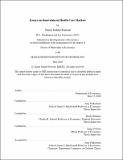Essays on innovation in health care markets
Author(s)
Oostrom, Tamar.
Download1191625789-MIT.pdf (5.322Mb)
Other Contributors
Massachusetts Institute of Technology. Department of Economics.
Advisor
Amy Finkelstein, Heidi Williams and James Poterba.
Terms of use
Metadata
Show full item recordAbstract
This thesis consists of three chapters on innovation in health care markets. The first chapter examines incentives in pharmaceutical innovation; the second explores selection in the response to recommendations in health care. The third chapter presents new evidence on determinants of recent drug overdose mortality. The first chapter examines the effect of financial incentives on reported drug efficacy in clinical trials. I leverage the insight that the exact same sets of drugs are often compared in different randomized control trials conducted by parties with different financial interests. I estimate that a drug appears 0.15 standard deviations more effective when the trial is sponsored by that drug's manufacturer, compared with the same drug in the same trial without the drug manufacturer's involvement. Publication bias explains a large share of this effect; observable characteristics of trial design and patient enrollment are less important. I find the sponsorship effect decreases over time as pre-registration requirements were implemented. The second chapter, joint with Liran Einav, Amy Finkelstein, Abigail Ostriker, and Heidi Williams, presents evidence on the role of selection in considering whether and when to recommend screening for a particular disease. In the context of recommendations that breast cancer screening start at age 40, we show that responders to the age 40 recommendation are less likely to have cancer and have smaller tumors than do women who self-select into screening at earlier ages. Responders to the age 40 recommendation also have less cancer than women who never screen, suggesting that the benefits of recommending early screening are smaller than if responders were representative of all covered individuals. The second chapter, joint with Liran Einav, Amy Finkelstein, Abigail Ostriker, and Heidi Williams, presents evidence on the role of selection in considering whether and when to recommend screening for a particular disease. In the context of recommendations that breast cancer screening start at age 40, we show that responders to the age 40 recommendation are less likely to have cancer and have smaller tumors than do women who self-select into screening at earlier ages. Responders to the age 40 recommendation also have less cancer than women who never screen, suggesting that the benefits of recommending early screening are smaller than if responders were representative of all covered individuals. The third chapter examines the role of declining community ties and social cohesion in the increase in drug overdose mortality in the past two decades. I assess the causal impact of declining religiosity on opioid deaths, instrumenting for religiosity with the Catholic sex-abuse scandal. I find that the recent decrease in religious employment would result in approximately one-third of the total current opioid mortality rate. The effects are concentrated in areas with higher Catholic rates before the scandal and among young adults.
Description
Thesis: Ph. D., Massachusetts Institute of Technology, Department of Economics, May, 2020 Cataloged from the official PDF of thesis. Includes bibliographical references (pages 191-203).
Date issued
2020Department
Massachusetts Institute of Technology. Department of EconomicsPublisher
Massachusetts Institute of Technology
Keywords
Economics.